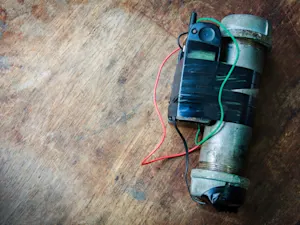
'Fake Biden' Robocall Plot Lands Consultant in Court
The voice on the phone sounded unmistakably familiar — steady, deliberate, with his trademark phrase, "what a bunch of malarkey," according to the Associated Press. But the man speaking wasn't President Joe Biden. It was an AI-generated deepfake sent to thousands of New Hampshire voters two days before the state's presidential primary. Now, the political consultant who commissioned the robocalls is on trial, accused of tampering with the democratic process in an unprecedented legal showdown.
The Trial of Steven Kramer
Steven Kramer, a longtime political consultant with experience on multiple campaigns, is facing 26 criminal charges in New Hampshire. His alleged offense? Sending out robocalls with an AI-generated voice designed to sound like then-President Joe Biden. Prosecutors say the calls were an attempt to suppress voter turnout by misleading residents into thinking they should skip the primary and vote in November instead.
Kramer admits to orchestrating the calls but insists his motivation was not political gain. Instead, he claims he wanted to demonstrate the dangers of AI in political messaging. "Maybe I'm a villain today," he told the Associated Press earlier this year, "but I think in the end we get a better country and better democracy because of what I've done, deliberately."
What the Robocall Said — and Didn't Say
The AI-generated message didn't explicitly mention Joe Biden by name, and that omission is a key part of Kramer's defense. But the voice used phrases often associated with the president, such as "malarkey," and encouraged voters to "save your vote for the November election," according to Fox News.
The calls reportedly reached between 5,000 and 25,000 voters. Prosecutors argue the intent was to confuse and mislead them — especially since the New Hampshire primary, traditionally the first in the nation, was already steeped in controversy due to a scheduling conflict with the Democratic National Committee.
A Question of Legitimacy
Kramer's defense hinges on his interpretation of the primary's validity. Because the Democratic National Committee had stripped New Hampshire of its first-in-the-nation status and President Biden's name wasn't on the ballot, Kramer claims he didn't view the vote as a "real" election.
His attorney, Thomas Reid, argued that Kramer's message was "opinion and commentary" about the DNC's actions, not an attempt to impersonate a candidate, according to the Associated Press. "He didn't see it as a real election, because it wasn't," Reid said in court.
The Legal Stakes
Kramer is charged with 13 felony counts of voter suppression and 13 misdemeanor counts of impersonating a candidate. If convicted on all counts, he could face decades behind bars. Each felony carries a potential seven-year sentence, and each misdemeanor up to a year in jail.
New Hampshire's assistant attorney general argued that Kramer knew what he was doing was deceptive. In court, prosecutors revealed that Kramer used his father's bank account to pay the AI creator — a New Orleans magician — and fabricated the name of a fake client to hide his involvement.
A Broader Battle Over AI
This isn't just about one consultant and one robocall. It's the first case of its kind to go to trial in the United States — testing how election laws apply to artificial intelligence.
The Federal Communications Commission has already fined Kramer $6 million and the telecom company that helped transmit the calls $2 million. But those fines remain under review, and Congress is now grappling with whether states should be allowed to regulate AI at all. A proposed clause in a House tax bill would ban state-level AI regulations for the next 10 years.
Public Reaction and Jury Considerations
So far, witnesses in the trial have said the call didn't deter them from voting, but many still found it disturbing. "That was horrific to my sensibilities that anybody would be trying to influence the vote in any election," one voter said in court, according to the Associated Press.
The judge instructed jurors that the state of New Hampshire held a legal presidential primary — regardless of what the DNC said — but jurors weren't required to accept that as a matter of belief. What they do have to decide is whether Kramer's robocall campaign crossed the line from provocative commentary into criminal conduct.
As the trial continues, it's clear this isn't just about a robocall in New Hampshire. It's about how democracy will grapple with AI and where the line lies between free speech and election interference.
References: Consultant behind AI-generated robocalls mimicking Biden goes on trial in New Hampshire | Man accused of sending AI robocalls to New Hampshire primary voters testifies at trial | Trial begins for political consultant accused of sending AI-generated robocalls mimicking Biden























